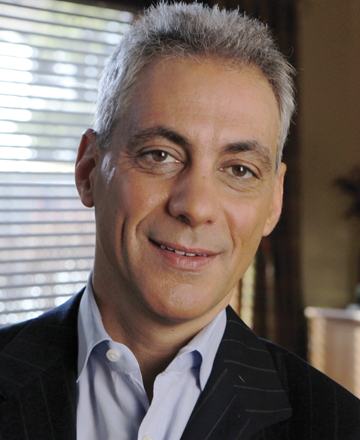
The "Will Do" Mayor
By N'DIGO Editor David Smallwood and Publisher Hermene Hartman (N'DIGO Political Editor Robert Starks contributed to this article.)
In the February 22 election, Rahm Emanuel beat the bejabbers out of the competition, winning 2,106 of 2,570 precincts (four out of five), according to a Sun-Times analysis.
He won the entire North Side, most of the Northwest and West sides, downtown, the south lakefront, the vast majority of the South Side, and nearly every majority-Black precinct, the paper found.
That's certainly a trouncing, and pretty much a mandate -- despite a lower than expected turnout, the vast majority of Chicagoans who bothered to vote basically told Rahm, you asked for it, you got it.
Now, the entire city -- and other interested parties nationwide -- wants to know what he's going to do with it.
Sharp, articulate, and forceful, Chicago Mayor-elect Emanuel sat down with N'DIGO recently in a wide-ranging conversation that touched on some of his plans for the city, his connects to the White House, and how he should be judged as mayor four years from now.
N'DIGO: Was the campaign process pretty grueling?
Mayor-elect Emanuel: I've been through more grueling, more stressful -- not that this wasn't stressful. The first four, five, six months of President Obama's term. President Clinton, too, when I think about it, taking back the House for the Democrats, that was pretty grueling.
This election was grueling mainly because you're out there on your own and you don't want to obviously make any mistakes to give anybody anything to work against you.
Given your experience and your connections, why would you want to run for mayor in light of the problems the city faces, when you could be in the private sector making money, still being in charge, and not having to go through such a trying process?
I did what I wanted in the private sector before. My goal was to learn something new.
When I went to the Clinton White House, I was single. Amy and I were dating, and we got engaged early in the process. But when I left after six years, I was married with two children and I could no longer just go, "Well, what's the next campaign I'm doing?" -- although the White House was my professional goal, starting back from when I graduated from college.
I needed to secure my family financially, and I achieved that. You're exactly right, though. I could have (gone back to the private sector). I could have done other things in the administration. Not only that, I had book offers and a lot of other things if I'd really wanted to, but that's not what interested me.
I wanted to come home and run for mayor because I think this is a critical time in the city's future, and I believe that the decisions we make in the next two to three years will determine the trajectory the city is on for the next 20 or 30 years.
This is what I wanted to do before and this is what I wanted to do after I left, and I enjoyed working with the president.
What are the biggest challenges you face as mayor and how will you handle them?
We have problems that I think are surmountable, but we have to get the basic three right, and they all involve a lot of different pieces.
We have to put our fiscal house in order because nobody is going to start really investing in the city if they think there is a big cost looming in the back. I think we have that potential, but we can't keep going for four years like this. We have some structural problems.
We have to get the schools right and focused on the right priorities. Then I have to get public safety right, because it's fundamental to the quality of life in our city.
I believe culture is a big piece, and we have a quality dance ballet company, a quality opera, a quality set of museums, but if half your kids are not graduating high school, that's not going to keep you a high quality city much longer.
So, how do you get them right?
Take education. The three things that matter most are 1) the quality of the principals, because the principals are held accountable for the results that they're building. 2) the quality of the teachers that are in that classroom and that they're up to the standards, knowing that they're teaching towards a graduation with a certain skill set at that graduation so the diploma has value at the end of the process. 3) making sure parents are off the sidelines because a principal and teacher can't do it if parents aren't involved.
I don't accept the notion that there are social and cultural issues that allow parents to get a pass on parenting. I don't; I will not...
Want More? , visit http://www.ndigo.com For Full Interview!
